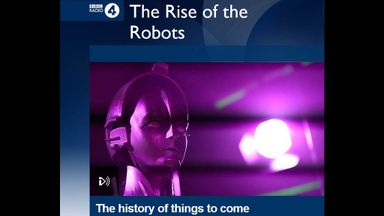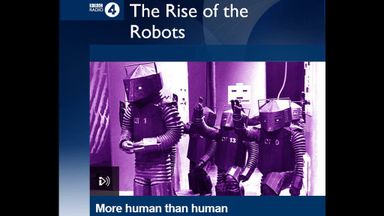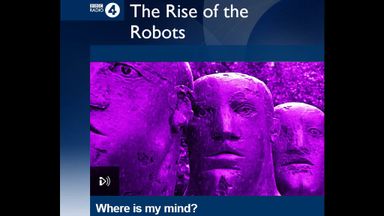The Rise of the Robots
1. The Role of Robots in Societies
Clips from this programme
Introduction (Adam Rutherford): Love and fear of Robots from fictional entertainment, a concept 1000's of years old: The Rise of the robots, automation changing society along with Artificial Intelligence (AI). The history and the culture
Duration: 03:20Early Robots: 1921: Rossum's Universal Robots, by Czech author Carel Chapek, The idea of robots goes back to the Ancient Greeks. In myths Hephaestus, the god of fire, created robots to assist in his workshop. Mechanical throne with mechanical birds (Dr Elly Truitt of Bryn Mawr College in the USA)
Duration: 04:41Robots': In France in the 15th century a Duke of Burgundy had his chateau filled with automata that played practical tricks on his guests, such as spraying water at them (Dr Elly Truitt of Bryn Mawr College in the USA), In 1738 in Paris: flute playing automaton, designed and built by Jacques Vaucanson (Dr Andrew Nahum of the Science Museum ): Vaucanson's Flute player, digesting duck, 1730s moving anatomy machines) (Simon Shaffer, Professor of History of Science at Cambridge University). Programmable machines, Human or machine? The mechanical Turk con-trick. Reactive robots need AI
Duration: 10:55Jacques Vaucanson automata led to Lyon Silk industry modernisation / fear robots will take our jobs (Simon Shaffer, Professor of History of Science at Cambridge University ), Luddites (Dr Ben Russell of the Science Museum ), Metropolis, R2D2, CP30. The word robot first appears in a 1921 play, Rossum's Universal Robots, Czech Carel Chapek. Robots or Zombies
Duration: 08:53The Rise of the Robots
1. The Role of Robots in Societies
First broadcast: 7th February 2017
Duration 27:50
The idea of robots goes back to the Ancient Greeks. In myths Hephaestus, the god of fire, created robots to assist in his workshop. In the medieval period the wealthy showed off their automata. In France in the 15th century a Duke of Burgundy had his chateau filled with automata that played practical tricks on his guests, such as spraying water at them. By the 18th century craftsmen were making life like performing robots. In 1738 in Paris people queued to see the amazing flute playing automaton, designed and built by Jacques Vaucanson. With the industrial revolution the idea of automata became intertwined with that of human workers. The word robot first appears in a 1921 play, Rossum's Universal Robots, by Czech author Carel Chapek.
Now playing
2. Our Relationship With These Machines
First broadcast: 14th February 2017
Duration 27:52
Robots are becoming present in our lives, as companions and as helpers. Some are humanoid, others are like dustbins. Adam Rutherford explores our relationship with these machines. Have we made them to be merely more dextrous versions of us? Why do we want to make replicas of ourselves? Should we be worried that they could replace us at work? Is it a good idea that robots are becoming carers for the elderly and for children with autism? In this programme Adam Rutherford meets some of the latest robots and their designers and compares the current reality with fictional robots from films.
3. Where Is My Mind?
First broadcast: 21st February 2017
Duration 27:41
Are we ready for artificial intelligences making decisions for us? From Skynet and the Terminator franchise, through Wargames and Ava in Ex Machina, artificial intelligences pervade our cinematic experiences. But AIs are already in the real world, answering our questions on our phones and making diagnoses about our health. Adam Rutherford asks if we are ready for AI, when fiction becomes reality, and we create thinking machines.






